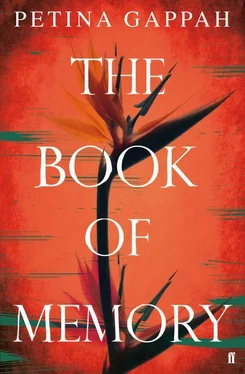With the leftover bits of wood, he carved little dolls with vacant faces on which we painted eyes and smiles. He made delicately fashioned replicas of cars out of thin wire. Everything I knew about cars, their different shapes and their names, came from those models. He made a Rolls-Royce car — a Silver Ghost, he called it — and Citroëns that looked like crouching frogs, Beetles and Mini Coopers, Massey Ferguson and John Deere tractors.
Those little cars are everywhere now — you can buy them anywhere, along with little soapstone sculptures and baskets made entirely out of bottle tops; you can buy them wherever there is a street and a corner to stand at, but in those days, my father was one of the few who made them.
As we watched him work, the sound of my mother’s music floated out of the house and into the garden. My mother’s taste ran to the maudlin. She liked the more mournful music of Jim Reeves and Dolly Parton and Porter Wagoner and Kenny Rogers, particularly the songs that were also stories. She listened to songs about Jeannie, a small child who was afraid of the dark and on whose grave there was always a light; about Little Rosa, a child crushed to her early death by a motor car; about Sue, who was actually a boy but had been given a girl’s name to toughen him up; and about Tommy, who was called a coward because he had promised his father to walk away from trouble if he could.
Her favourite record was about a soldier who was arrested on a long march during the North African campaign and brought before the provost marshal. Even now, in Chikurubi, the words of that song come to me with as sharp a clarity as if I were listening to it from the back of our house. The soldier responded to the charges against him by stating that each card in the deck he carried stood for some theological principle or tenet, and concluded that his cards served him not only as a prayer book and almanac, but also as a Bible. Even as a child, I thought it must surely be easier for the soldier to carry a very small Bible than to remember what each card represented.
Three days ago in the garden, I heard Jimmy Blue Butter sing ‘Coward of the County’ as she worked, and I was again at home with Kenny Rogers on the radio as my mother sobbed and we waited for her mood to pass and the music to cease so that we could get back inside the house.
I do not want to give you the impression that my mother was like this all the time. But I believe that we were afraid to laugh because our laughter so very often had to be switched off if she decided she did not want to hear it.
She was most joyous on our birthdays; she went to great trouble to make vetkoeks for breakfast, which we ate instead of bread. She whisked the batter together before dropping it in little dollops in the hot oil. I liked to watch the balls become round and golden.
After we ate the vetkoeks, we all sang ‘Happy Birthday’, and she put on records and we danced. On those days, she retired Jeannie and Little Rosa and Tommy and the boy named Sue, and instead played ‘Bhutsu Mutandarikwa’ or other happy songs. But even these occasions were not without their fraught moments, as she sometimes got mixed up on the dates.
She thought one day that it was Joyi’s birthday when it wasn’t. She made us come inside to put on our Christmas dresses, which were also our birthday dresses. For everyday clothes, my mother went to Express Stores, but once a year, in December, we took the Zupco bus to Fourth Street and walked to First Street to gaze at the lights on the giant Christmas tree, and do window-shopping at Barbours, Greatermans and Miltons, before going to buy our annual Christmas-Birthday clothes at the Topics red-hanger sale.
Our dresses were always the same, but in different colours. The year that my mother mistook Joyi’s birthday, mine was orange, which made me happy because it was a colour I loved above all others; Joyi’s was blue and Mobhi’s pink. She told us to change into these dresses. We could not start the party without our special clothes.
We were too afraid to tell her that it was no one’s birthday, or that it was not Christmas. Instead we went along with her excitement. She went by herself to the shops and brought back a rectangular cake with pink frosting all over it. While she was getting the cake, Joyi and I changed into our clothes and helped Mobhi into hers.
When my mother came back with candy cakes, she turned on the radiogram to play ‘Bhutsu Mutandarikwa’.
The song played three times and each time it played, she made us dance. Then the music stopped with a harsh scratch as she snatched the needle from the radiogram. We stopped dancing and stood in silence, looking at her.
‘Stop looking at me with those eyes,’ she said. ‘What are you doing in here anyway, what kind of children are you, always indoors when you should be out playing with other children? And who said you can wear those clothes?’
I could see that Joyi was about to blurt that it was my mother herself who had called us in not moments ago and insisted that we change. I stopped her in time and tried to herd everyone out.
But we were too slow for my mother. She took up the record from the radiogram and threw it at me. It spun towards me, just glancing my ear, before smashing against the wall. The cake followed. We were too slow. Mobhi slipped in the cake, came down hard on her bottom and sat in the middle of the mess wailing that her dress was dirty. I walked back quickly to pick her up and ran out with her struggling in my arms.
When my father found us in the sun outside, he held the wall to steady himself before going back into the house.
The next time that my father went to the shops, he bought us a new ‘Bhutsu Mutandarikwa’. At the next real party, which was Mobhi’s party, my mother made us wear our Christmas-Birthday clothes. We danced to the song again and again just as we had done before, like nothing had happened.
I no longer recall where my father was on the day of the false birthday party. He rarely left the house. He did not go out to work like other fathers. He paid a boy to bring him what he needed in a scotch-cart. As he expected his customers to come to him, he did not sell much, but still managed enough that we did not have to eat Lacto or matemba every day.
When he left the house, he usually took us with him. He took us to the Agricultural Show every year, where we headed straight to the horses. My father was mad about racing. Away from the show, racing was part of our lives — even my mother was silenced by Peter Lovemore’s voice. The radio was a part of my father’s every moment.
Our father worked from the back of our house, where wood was stacked. He kept his things under a dark-green tarpaulin to protect them from the dust and the sun and the rain. Before we moved to Mufakose, he had worked in a factory. Then he had ridden his bicycle to work in the Western industries before he stopped working there and began to work from home.
My mother was angry when our neighbour said the factory that made furniture for Mashonaland Furnishers was looking for workers and he refused to go and stand in line for a job.
The other children routinely mocked us because our father walked us to school every day. Only on the first day, and sometimes not even then, did parents walk the grade ones, the very youngest children, to school. While other children moved to school together in little bunches of blue-and-maroon or green uniforms, we walked with our father.
He carried Mobhi on his shoulders, her fat little legs wriggling as she laughed through the smoke and called out the names of any people that she recognised. Joyi and I tried to melt into the road as we passed staring children.
After he left us at school, my father walked back home with Mobhi and spent the rest of the day behind the house doing his carpentry work while she played around him. My mother, prone to headaches and other complaints, usually kept to her room.
Читать дальше












